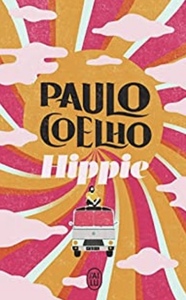Take a photo of a barcode or cover
This one was not my favorite of his, but he always includes some valuable wisdom. Though it was tedious at times, it was still worth a read.
That I might walk without need of my feet, see without needing to look, fly without asking for wings.
As an ardent reader of Paulo Coelho works (I still have books stashed in my shelf that I need to complete), Hippie was an OK read. Paulo in this book writes about his early twenties something experiences where he describes and discovers through his journey, the very definition of a 'Hippie'. A Brazilian young man wanders through the streets of Amsterdam where he meets a young Danish woman. No, they don't fall in love.
But they do decide to travel in a Magic Bus that promises them to take from Amsterdam to Nepal crossing many countries on the way.
But they do decide to travel in a Magic Bus that promises them to take from Amsterdam to Nepal crossing many countries on the way.
slow-paced
Plot or Character Driven:
Character
Strong character development:
No
Loveable characters:
No
Diverse cast of characters:
No
Flaws of characters a main focus:
No
started off well but gradually starting getting predictable and boring
Hippie no me toco de la misma manera que lo hizo The Alchemist, sin embargo, es una lectura interesante y se aprende mucho sobre Paulo Coelho y el que, donde y como dio forma a su vida. Esta escrito en tercera persona, lo que a veces fue frustrante.
interesting ideas, engaging story but very unrealistic dialogues. the characters' speeches don't differ, which makes them feel unrealistic and flat. it really feels like the author is telling it only from his own perspectiv although so many people helped and paolo coelho tried to compensate by telling the story from the 3. perspective.
This book was fine as a summer read, but didn't really make an impact. I always enjoy the language in books by Paulo Coelho though, so the reading experience was good.
I loved this time in history. I was too young for most of it and was not into drugs but I feel very connected to this time and movement. Paulo’s writing pulls you in and takes you on a journey full of adventure, travel, self-discovery and interesting characters. He was very spiritual and while he wasn’t against smoking marijuana or trying drugs it wasn’t his practice. He loved Rumi and was looking for that ecstasy. There were some very cool quotes.
Hippie provides a snapshot of 1969 and the desire 20 somethings had to leave responsibilities behind and travel the world. These self-described hippies sleep in parks, have long hair, wear vibrant clothes and are on journeys of self-discovery much to the disapproval of their parents.
Included in these travellers is a young Paulo Coelho who has set out on a trip with his girlfriend. After a kidnapping in South America, a journey on the 'Death Train to Bolivia' and subsequent break-up he finds himself in Amsterdam with one year to spend traveling Europe. At the same time, a Dutch student Karla is sitting in Amsterdam's Dam Square after a fortune teller has told her she will met the person she is destined to travel with. When their stories combine, Karla convinces Paulo to go with her of the Magic Bus which travels across Europe and Central Asia to Kathmandu. The story is worth reading just for an account of these bus trips which were run during the late 60s and early 70s and were essentially constant driving with stories from other hippies as the only source of entertainment. Throughout their trip, Coelho uses third perspective to tell the stories of Karla, the bus driver and other Magic Bus travellers. From this we are given a look at why people were drawn to this way of travel and that is isn't always just a way of running from responsibilities but for some is a way of gaining a new appreciation for life. While there is still the impression that many of these travelers were driven by self-indulgence, Coelho does well to portray them as people who are more than just ‘dirty hippies.’ While travel stories are everywhere these days, the lyrical and thought-provoking writing style sets this one apart and creates a narrative that is both entertaining and reflective.
Included in these travellers is a young Paulo Coelho who has set out on a trip with his girlfriend. After a kidnapping in South America, a journey on the 'Death Train to Bolivia' and subsequent break-up he finds himself in Amsterdam with one year to spend traveling Europe. At the same time, a Dutch student Karla is sitting in Amsterdam's Dam Square after a fortune teller has told her she will met the person she is destined to travel with. When their stories combine, Karla convinces Paulo to go with her of the Magic Bus which travels across Europe and Central Asia to Kathmandu. The story is worth reading just for an account of these bus trips which were run during the late 60s and early 70s and were essentially constant driving with stories from other hippies as the only source of entertainment. Throughout their trip, Coelho uses third perspective to tell the stories of Karla, the bus driver and other Magic Bus travellers. From this we are given a look at why people were drawn to this way of travel and that is isn't always just a way of running from responsibilities but for some is a way of gaining a new appreciation for life. While there is still the impression that many of these travelers were driven by self-indulgence, Coelho does well to portray them as people who are more than just ‘dirty hippies.’ While travel stories are everywhere these days, the lyrical and thought-provoking writing style sets this one apart and creates a narrative that is both entertaining and reflective.
Hippie is like an autobiographical venture, where the author talks about finding himself and answers to some questions in his life, while on a road trip journey on a ‘magic bus’ from Amsterdam to Istanbul. There are other passengers on the bus, who have their own story and there is Karla, his co-companion. Everyone has a back story, and is either fighting their demons, or searching for their purpose. The story is set during the famous Hippie era, so there is a lot of first hand information about what it was to be a ‘Hippie’ in those times and how they were treated by others around them.
Things I liked about the book:
•You get a lot of first hand knowledge about the Hippie culture, the origin of the term, their way of living and what they believed in, the way they were treated or mis-treated during those days, from the book. I always like books that you can learn from
•You also get introduced to different types of religions, nothing in depth, but a definite introduction to religions across the world such as Hinduism, Sufism, Islam, Buddhism
•A lot of information on different types of drugs and the differences in the effects that each drug has – almost like a manual, or guide..lol
•As is always with Paulo’s books, there is a lot of spiritual learning that can be obtained from reading his books. For most parts, the simplicity of his writing and the joy with which he describes spirituality, will actually make you feel that joy while reading. Some parts of the books made me want to stand up and dance with an abandon, just like he did. Some parts made me smile, and some parts resonated with my own beliefs such as those of charity and how it gives more to the doer than the receiver
Things that didn’t work for me:
•I can’t say this book was able to surpass the impact Eleven Seconds had for me. Again, maybe it was just the timing and the place in life when I read each book that made the difference
•I can take writing on spirituality, but as soon as it intermingles with religion or a name or type of God, I start to lose interest, due to my recent conversion to Atheism. Maybe this is a phase too, who knows. But there were a lot of moments in the book when Paulo talks about God, discovering Him and finding oneself in Him. I just couldn’t relate to those bits at all
•The ending felt sudden to me. As if the author decided he didn’t want to talk about it anymore, once the elation of the beginning of the journey had ended. I wanted to know more about Karla. I also thought there will be more information on the whole journey, like a book on travel. But actually, it was more about a book on spirituality, that just happened to take place for these people on board the magic bus
Things I liked about the book:
•You get a lot of first hand knowledge about the Hippie culture, the origin of the term, their way of living and what they believed in, the way they were treated or mis-treated during those days, from the book. I always like books that you can learn from
•You also get introduced to different types of religions, nothing in depth, but a definite introduction to religions across the world such as Hinduism, Sufism, Islam, Buddhism
•A lot of information on different types of drugs and the differences in the effects that each drug has – almost like a manual, or guide..lol
•As is always with Paulo’s books, there is a lot of spiritual learning that can be obtained from reading his books. For most parts, the simplicity of his writing and the joy with which he describes spirituality, will actually make you feel that joy while reading. Some parts of the books made me want to stand up and dance with an abandon, just like he did. Some parts made me smile, and some parts resonated with my own beliefs such as those of charity and how it gives more to the doer than the receiver
Things that didn’t work for me:
•I can’t say this book was able to surpass the impact Eleven Seconds had for me. Again, maybe it was just the timing and the place in life when I read each book that made the difference
•I can take writing on spirituality, but as soon as it intermingles with religion or a name or type of God, I start to lose interest, due to my recent conversion to Atheism. Maybe this is a phase too, who knows. But there were a lot of moments in the book when Paulo talks about God, discovering Him and finding oneself in Him. I just couldn’t relate to those bits at all
•The ending felt sudden to me. As if the author decided he didn’t want to talk about it anymore, once the elation of the beginning of the journey had ended. I wanted to know more about Karla. I also thought there will be more information on the whole journey, like a book on travel. But actually, it was more about a book on spirituality, that just happened to take place for these people on board the magic bus



